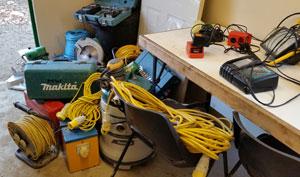A Kent based contractors has again called upon Portable Appliance Testing specialist, MRB Electrical & PAT Testing, to maintain its sub-contractors electrical equipment at another of its new construction sites.
Kent based Portable Appliance Testing specialist, MRB Electrical & PAT Testing, has been working closely with a Kent carpentry contractors for almost a year, initially providing 110v electrical appliance safety inspections at a five property refurbishment in Gillingham.
In November MRB were contracted in to carry out PAT Testing at a further two construction sites, a large housing development in Sittingbourne and a farm buildings conversion in Folkestone, then in March a fourth site, another new larger housing development, this time in Canterbury.
All 110v and mains voltage equipment had passed inspection and testing across all sites following a few minor repairs including replacement of broken plugs and rewiring of leads. Minor repairs such as these are typical of electrical appliances on construction sites and most repairs can be catered for on site with frequently required spares being available.
Main Contractor Gary Piper commented;
"I chose to work with MRB initially due to the lower cost compared to other PAT Testing quotes i had received, though my main concern was the safety of my sub-contractors and their electrical appliances. MRB are always happy to arrange testing schedules to suit the requirements of my sites. Both myself and my sub-contractors are happy with the service provided and look forward to MRB Electrical & PAT Testing looking after us in the future".
About Construction Site Portable Appliance Testing
The Institution of Engineering and Technology, (IET), recommends that 110v appliances on a construction site undergo visual user checks every week, however these checks are not recorded unless a fault is found. This is followed by a formal visual inspection every month by a qualified and competent person and these results are recorded. Finally, combined formal visual inspection and testing, by a qualified and competent person with specialist test equipment is recommended at no more than three month intervals.
Many construction companies and their insurance underwriters are insisting on following the recommendations as a way of fulfilling obligations under relevant legislation.
